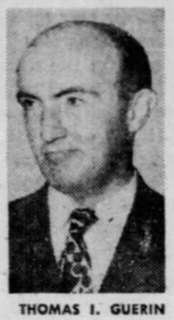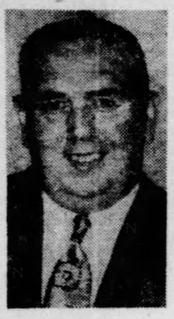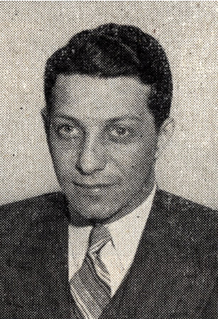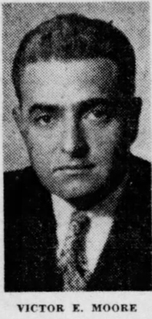
Charles Michael Finley (February 25, 1899 – August 25, 1958) was a Democratic businessman and politician from Philadelphia.

The Democratic Party is one of the two major contemporary political parties in the United States, along with the Republican Party. Tracing its heritage back to Thomas Jefferson and James Madison's Democratic-Republican Party, the modern-day Democratic Party was founded around 1828 by supporters of Andrew Jackson, making it the world's oldest active political party.

Philadelphia, sometimes known colloquially as Philly, is the largest city in the U.S. state and Commonwealth of Pennsylvania, and the sixth-most populous U.S. city, with a 2017 census-estimated population of 1,580,863. Since 1854, the city has been coterminous with Philadelphia County, the most populous county in Pennsylvania and the urban core of the eighth-largest U.S. metropolitan statistical area, with over 6 million residents as of 2017. Philadelphia is also the economic and cultural anchor of the greater Delaware Valley, located along the lower Delaware and Schuylkill Rivers, within the Northeast megalopolis. The Delaware Valley's population of 7.2 million ranks it as the eighth-largest combined statistical area in the United States.
Finley was born in Philadelphia in 1899 to Michael Finley and Katherine Reilly Finley. [1] Michael Finley was active in Democratic politics in the city, and his son followed him in that role. [1] Finley started his working life as a chauffeur before attending La Salle College. [2] After graduation, he became involved in textile manufacturing. [2] Finley took his first political job at a State Revenue Department, and later worked for the Internal Revenue Service as chief of the Social Security division. [2] He became director of the State Liquid Fuels Tax Bureau, where he was in charge of administering gasoline taxes. [3] While working in state government, he became the Democratic leader for Philadelphia's 50th ward (covering his neighborhood of West Oak Lane) at a time when Republicans dominated the city's politics. [2]

La Salle University is a private, Roman Catholic university in Philadelphia, Pennsylvania. Named for St. Jean-Baptiste de La Salle, the university was founded in 1863 by the Institute of the Brothers of the Christian Schools. The university offers traditional, online, and hybrid courses and programs. The university is affiliated with the Roman Catholic Church through the Archdiocese of Philadelphia.

The Internal Revenue Service (IRS) is the revenue service of the United States federal government. The government agency is a bureau of the Department of the Treasury, and is under the immediate direction of the Commissioner of Internal Revenue, who is appointed to a five-year term by the President of the United States. The IRS is responsible for collecting taxes and administering the Internal Revenue Code, the main body of federal statutory tax law of the United States. The duties of the IRS include providing tax assistance to taxpayers and pursuing and resolving instances of erroneous or fraudulent tax filings. The IRS has also overseen various benefits programs, and enforces portions of the Affordable Care Act.

West Oak Lane is a neighborhood in the Uptown section of Philadelphia. The neighborhood was developed primarily between the early 1920s and late 1930s, with the areas near to Cedarbrook constructed after World War II. At the northeast corner of Limekiln Pike and Washington Lane was the site of the Cedar Park Inn, a historic tavern built in the early 19th century, which was torn down sometime after 1931 as the neighborhood was being fully developed.
In 1951, Philadelphia adopted a new city charter; that same year, Democrats swept to victory in mayoral and city council races, breaking the Republicans' 67-year-long control of city government. [4] Finley was among those elected, winning a city council seat from the ninth district with 63% of the vote. [4] The Democratic party was led by a reform faction that attracted the votes of many Republicans disappointed in political corruption under their party's leadership. [4] He served as chairman of the Council's committee on Municipal Development and Zoning. [1] In 1954, Finley backed the reform faction of the party, led by mayor Joseph S. Clark, Jr., when several ward leaders led by Democratic City Chairman William J. Green, Jr., unsuccessfully sought to amend the city charter to remove civil service reforms. [5] Finley was reelected as councilman from the ninth district in 1955 with 61% of the vote. [6] He died of a heart attack in 1958 while vacationing in Margate, New Jersey. [1] He is buried in Whitemarsh Memorial Park in Ambler, Pennsylvania.

Ambler is a borough in Montgomery County, Pennsylvania, in the United States. It is located approximately 16 miles (26 km) north of the city center of Philadelphia, Pennsylvania.












